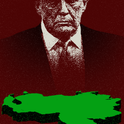Israeli prime minister Ehud Olmert, under the weight of multiple police investigations, announced last week that he would not be competing in the upcoming September 17 primary of his Kadima party and would yield the premiership to the next party leader—as I suggested he would in my Prospectarticle on Marwan Barghouti. Who will replace him? Olmert has made it painfully clear that his own preference is transport minister and former military chief of staff Shaul Mofaz, rather than the other main contender, foreign secretary Tzipi Livni.
This has more to do with geo- than with personal politics. Livni has long been outspoken about Olmert's tribulations, publicly speaking out against his scandals and calling on him to resign, while Mofaz has been more the loyalist. Yet were Livni to win, it's likely that the peace talks with the Palestinians would continue more or less along the lines that Olmert has laid out, with Kadima falling in line with the left-of-centre Labor party leader and current defence minister, Ehud Barak. The centre-right Mofaz, on the other hand, could be expected to adopt blocking tactics, aligning with right-wing parties like Likud and even the ultra-right Avigdor Lieberman's Israel B'teynu party—which has called for Israel to hold on to West Bank territories and even for the expulsion of Palestinian citizens living inside Israel's 1967 borders.
If Mofaz does win the Kadima primary, it is also possible that the current government will simply fall and the country will go to new elections. If the polls are to be believed, hardliner Likud leader Benjamin Netanyahu would become Israel's next prime minister—which would certainly not auger a continuation of the Olmert peace initiatives. So will Olmert's legacy be to scuttle his peace efforts—which he has promised to maintain during his last days as prime minister—in order to gain vengeance against Livni and others who have called for his downfall? Stay tuned.
After Olmert
August 04, 2008












